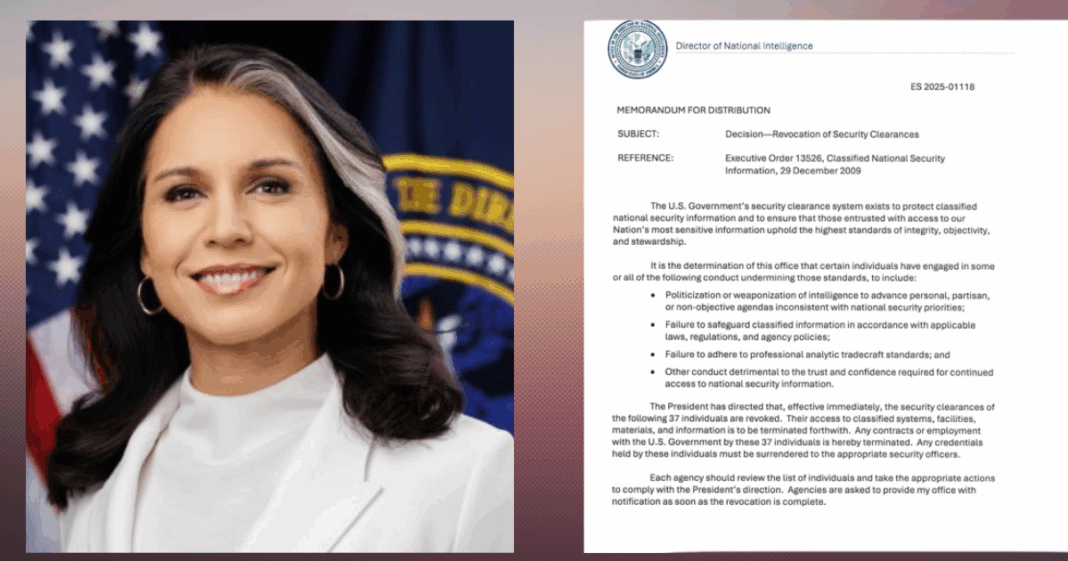- Director of National Intelligence Tulsi Gabbard said 37 current and former officials “abused public trust” and had their clearances revoked, effective immediately.
- The directive orders agencies to cut access to classified systems and retrieve credentials in line with federal rules on safeguarding national security information.
- Several of those named were involved in work surrounding the 2017 U.S. assessment of Russian interference in the 2016 election, according to multiple news reports.
The Big Picture
The Office of the Director of National Intelligence announced the revocation of security clearances for 37 current and former officials. Gabbard posted the decision and an unclassified memo outlining the rationale on X (see statement), saying the move responds to politicization and mishandling of classified material.
What’s New
The memo states that affected individuals engaged in one or more violations, including using intelligence for non-objective agendas, failing to safeguard classified information, or not following analytic tradecraft standards. Agencies were instructed to terminate access “forthwith,” recover badges and credentials, and confirm completion to ODNI. Reporting by major outlets said the list includes former senior national security officials and some tied to debates over the 2017 Intelligence Community Assessment on Russian influence operations.
Who Is Affected
- Andrew Cedar
- Andrew P. Miller
- Benjamin A. Cooper
- Beth E. Sanner
- Brett M. Holmgren
- Charles A. Kupchan
- Christopher Center
- Corinne A. Graff
- Dilpreet K. Sidhu
- Edward Gistaro
- Emily J. Horne
- Harry Hannah
- Heather R. Gutierrez
- Jamie S. Jowers
- Jeffrey M. Prescott
- Joel T. Meyer
- Joel Willett
- John W. Ficklin
- Julia S. Gurganus
- Julia Santucci
- Loren DeJonge Schulman
- Luke R. Hartig
- Maher B. Bitar
- Mark B Feierstein
- Mary Beth Goodman
- Megan F. Doherty
- Michael P. Dempsey
- Perry J. Blatstein
- Richard H. Ledgett
- Samantha E. Vinograd
- Sarah S. Farnsworth
- Shelby L. Pierson
- Stephanie O’Sullivan
- Thomas W. West
- Vinh X. Nguyen
- William J. Tuttle
- Yael Eisenstate
What They’re Saying
Context
The action follows months of scrutiny by the administration over how past intelligence judgments were reached and used. Earlier directives instructed agencies to review and, where appropriate, rescind access for individuals no longer serving in national security roles. The 2017 assessment, produced at the end of the Obama administration, concluded Russia interfered in the 2016 election; its scope, methodology, and subsequent political fallout have remained contested in the years since, with supporters calling it a necessary warning and critics arguing it was over-interpreted.
What’s Next
Departments are expected to complete revocation steps and report compliance to ODNI. Legal challenges are possible from those affected, and congressional oversight committees may seek documentation underlying the determinations. The administration has signaled additional measures aimed at tightening access controls and enforcing tradecraft standards across the Intelligence Community.
The Bottom Line
The sweeping revocation targets 37 figures across past and present ranks, underscoring the administration’s push to police perceived politicization inside the intelligence system while igniting a fresh fight over how intelligence should be gathered, vetted, and communicated to policymakers.
A global media for the latest news, entertainment, music fashion, and more.














